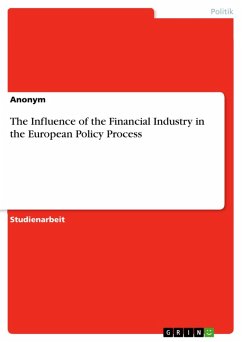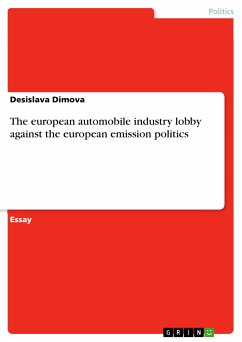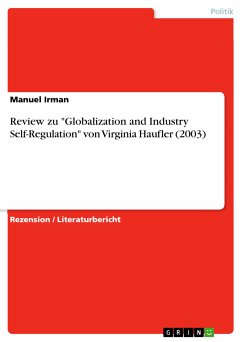
The Influence of the Financial Industry in the European Policy Process (eBook, ePUB)
Sofort per Download lieferbar
Statt: 17,95 €**
13,99 €
inkl. MwSt. und vom Verlag festgesetzt.
**Preis der gedruckten Ausgabe (Broschiertes Buch)
Alle Infos zum eBook verschenkenWeitere Ausgaben:

PAYBACK Punkte
0 °P sammeln!
Studienarbeit aus dem Jahr 2010 im Fachbereich Politik - Thema: Europäische Union, Note: keine, , Sprache: Deutsch, Abstract: At the end of 2005, the European Commission released a white paper on financial service policy (EC 2005: 3). It was called "the best financial framework in the world" (EU Press 2005 found in Stichele 2008: 13). After the Lehman Brothers bankruptcy in September 2008 and the accompanied full break out of the financial crisis, the question on, how such a crisis could occur with the regulation in place, was raised for good reason. Independent experts have warned that the a...
Studienarbeit aus dem Jahr 2010 im Fachbereich Politik - Thema: Europäische Union, Note: keine, , Sprache: Deutsch, Abstract: At the end of 2005, the European Commission released a white paper on financial service policy (EC 2005: 3). It was called "the best financial framework in the world" (EU Press 2005 found in Stichele 2008: 13). After the Lehman Brothers bankruptcy in September 2008 and the accompanied full break out of the financial crisis, the question on, how such a crisis could occur with the regulation in place, was raised for good reason. Independent experts have warned that the actual lax regulation would lead to a crisis, but according to Haar et al. the Commission preferred to listen to the one-sided advice from the financial industry (2009b: 3). After the full extent of the crisis and the failures in regulation policy became obvious, one might have expected that new financial regulation would be set up fast. On the G-20 meeting in London in April 2009, Gordon Brown and others proclaimed a counter strike against the financial and economic crisis by. But according to observers, after these confessions, not much has happened in practice due to financial lobby resistance (Zeit 2009). Still in April 2010, the German newspaper Zeit pointed out that the financial industry's power has prevented new financial regulation. Although financial lobby influence is certainly not the only reason, why regulatory reform is not getting further, it has a strong influence in the policy process and overshadows other interests. In Europe, it is especially effective: The European market has been continuously liberalized, but supervision did not keep up with this trend. Financial regulation must satisfy the international level but should also be flexible enough to grasp national differences. Moreover countries are played off against each other. When a single country decides to regulate more strictly, companies can always threaten to leave the country (Stichele 2008: 40, 48). All these considerations give good reason to analyze how the financial industry seeks influence in the European policy process. This paper aims to introduce the different institutional channels where influence can be exercised.
Dieser Download kann aus rechtlichen Gründen nur mit Rechnungsadresse in A, B, BG, CY, CZ, D, DK, EW, E, FIN, F, GR, HR, H, IRL, I, LT, L, LR, M, NL, PL, P, R, S, SLO, SK ausgeliefert werden.













